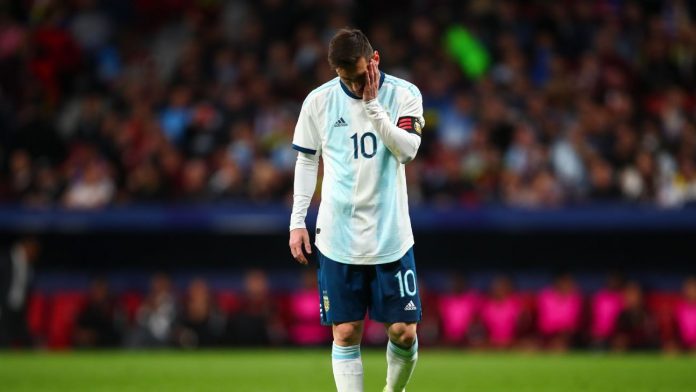It was a familiar story for Lionel Messi on his return to international duty. As he took the field in Madrid for Argentina’s friendly against Venezuela, a fan held up a banner with his name written on it. But the banner was upside down — an appropriate symbol for the way that the Barcelona genius is left mixed up and shaken up by the deficiencies of his compatriots.
Venezuela’s 3-1 win highlighted a problem that Argentina have struggled to solve for years — one which was all too evident in the disastrous World Cup campaign in Russia. The team’s defensive resources are a grave worry. Coach after coach has wrestled with the problem of balancing out the side, finding enough solidity at the back to get the most from Messi’s flashes of inspiration.
The latest, caretaker coach Lionel Scaloni, got his starting lineup wrong against Venezuela. The problems were made all the more apparent by the early Venezuelan goal — a punt from left-back Roberto Rosales spraying a beautiful long ball behind the defensive line for big centre-forward Salomon Rondon to lash home on the volley.
Rondon had worked himself the wrong side of Gabriel Mercado — a strange choice to anchor a line of three centre-backs. Mercado is a gutsy right-back who can play in the centre, but this role demanded someone who can organise those around him. It was asking too much, and the choice of a back three in general was questionable. Argentina’s wing-backs — Gonzalo Montiel and Nicolas Tagliafico — are not Cafu and Roberto Carlos, and would not seem to offer enough attacking threat to make the system worthwhile. As it was, Scaloni’s defensive system could not cope with the power of Rondon or the pace of wingers Jhon Murillo and Darwin Machis. Venezuela, with little possession, led by two goals at the interval — and it could have been by four.
Argentina had some moments. All of them involved Messi, and his partnership with new centre-forward Lautaro Martinez at least looks promising. Martinez is lean and aggressive, and every time Messi played the ball into the danger area, it was attacked with relish by the Inter Milan man. Venezuela’s 21-year-old goalkeeper Wuilker Farinez largely won the battle though, and as a graduate of the side that reached the final of the 2017 Under-20 World Cup, it is a splendid symbol of Venezuela’s realistic hopes of making their debut in the senior version of the competition in 2022.
The need to protect the heart of their defence against Messi forced the Venezuelan back four to play tightly together, funnelling in close. It left gaps down the side, and Messi found one in the second half, setting up Giovani Lo Celso, whose quick, low centre was swept home by Inter Milan’s Martinez for his first international goal.





